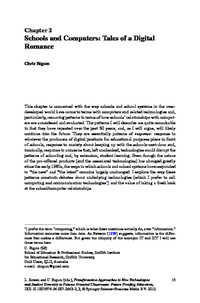Schools and Computers: Tales of a Digital RomanceChris Bigum
Zu finden in: Transformative Approaches to New Technologies and Student Diversity in Futures Oriented Classrooms (Seite 15 bis 28), 2012
 |
 |
 Diese Seite wurde seit 4 Jahren inhaltlich nicht mehr aktualisiert.
Unter Umständen ist sie nicht mehr aktuell.
Diese Seite wurde seit 4 Jahren inhaltlich nicht mehr aktualisiert.
Unter Umständen ist sie nicht mehr aktuell.
 Zusammenfassungen
Zusammenfassungen
 This chapter is concerned with the way schools and school systems in the over-developed world have come to terms with computers and related technologies and, particularly, recurring patterns in terms of how schools´ relationships with computers are considered and evaluated. The patterns I will describe are quite remarkable in that they have repeated over the past 30 years, and, as I will argue, will likely continue into the future. They are essentially patterns of response: response to whatever the producers of digital products for educational purposes place in front of schools; response to anxiety about keeping up with the schools-next-door and, ironically, response to concerns that, left unchecked, technologies could disrupt the patterns of schooling and, by extension, student learning. Even though the nature of the pro-offered products (and the associated technologies) has changed greatly since the early 1980s, the ways in which schools and school systems have responded to 'the new†and 'the latest†remains largely unchanged. I explore the way these patterns constrain debates about underlying technologies (which I prefer to call computing and communication technologies) and the value of taking a fresh look at the school/computer relationships.
This chapter is concerned with the way schools and school systems in the over-developed world have come to terms with computers and related technologies and, particularly, recurring patterns in terms of how schools´ relationships with computers are considered and evaluated. The patterns I will describe are quite remarkable in that they have repeated over the past 30 years, and, as I will argue, will likely continue into the future. They are essentially patterns of response: response to whatever the producers of digital products for educational purposes place in front of schools; response to anxiety about keeping up with the schools-next-door and, ironically, response to concerns that, left unchecked, technologies could disrupt the patterns of schooling and, by extension, student learning. Even though the nature of the pro-offered products (and the associated technologies) has changed greatly since the early 1980s, the ways in which schools and school systems have responded to 'the new†and 'the latest†remains largely unchanged. I explore the way these patterns constrain debates about underlying technologies (which I prefer to call computing and communication technologies) and the value of taking a fresh look at the school/computer relationships. Dieses Kapitel erwähnt ...
Dieses Kapitel erwähnt ...
 Personen KB IB clear | Larry Cuban , Elizabeth Eisenstein , Matthew J. Koehler , Punya Mishra , L. J. Perelman , E. M Rogers | ||||||||||||||||||||||||||||||||||||||||||||||||||||||
 Bücher |
| ||||||||||||||||||||||||||||||||||||||||||||||||||||||
 Texte |
|
 Zitationsgraph
Zitationsgraph
 Zitationsgraph (Beta-Test mit vis.js)
Zitationsgraph (Beta-Test mit vis.js)
 Anderswo finden
Anderswo finden
 Volltext dieses Dokuments
Volltext dieses Dokuments
 |  Schools and Computers: Tales of a Digital Romance: Artikel als Volltext bei Springerlink ( Schools and Computers: Tales of a Digital Romance: Artikel als Volltext bei Springerlink ( : :  , 180 kByte; , 180 kByte;  : :  2020-11-28) 2020-11-28) |
 Anderswo suchen
Anderswo suchen 
 Beat und dieses Kapitel
Beat und dieses Kapitel
Beat hat Dieses Kapitel während seiner Zeit am Institut für Medien und Schule (IMS) ins Biblionetz aufgenommen. Beat besitzt kein physisches, aber ein digitales Exemplar. Eine digitale Version ist auf dem Internet verfügbar (s.o.). Aufgrund der wenigen Einträge im Biblionetz scheint er es nicht wirklich gelesen zu haben. Es gibt bisher auch nur wenige Objekte im Biblionetz, die dieses Werk zitieren.















 Biblionetz-History
Biblionetz-History